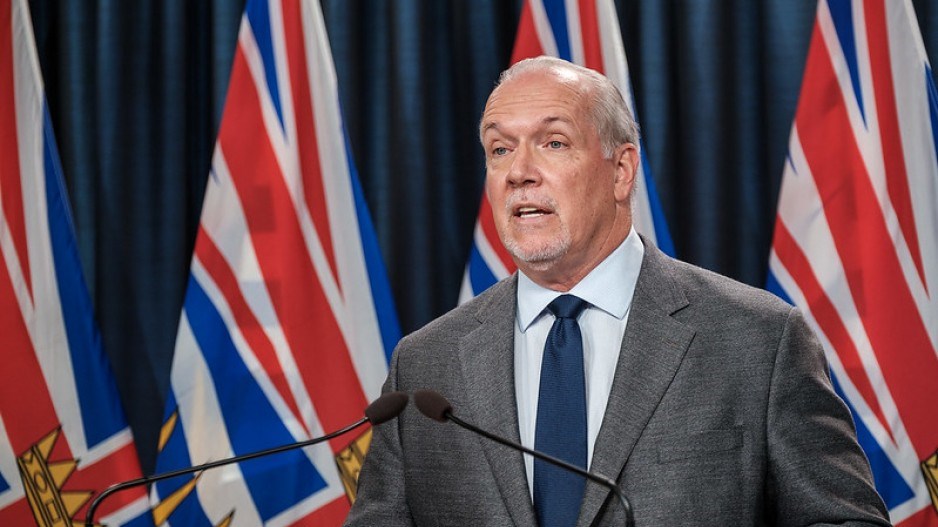BC NDP Leader John Horgan says he’s sending British Columbians to the polls in the midst of a pandemic to stave off political instability.
“This pandemic will be with us for a year or more. And that's why I believe we need to have an election. Now, we can either delay that decision and create uncertainty and instability over the next 12 months, more speculation, more talk about what might be, or we can do what I believe is always the right thing: And that's ask British Columbians what they think,” he said during a September 21 media briefing.
“I want everyone to know that I've struggled mightily with this decision and it did not come easy to me.”
Horgan made the remarks shortly after meeting with B.C. Lt.-Gov. Janet Austin, in which he asked her to dissolve the legislature.
The province is now set for an October 24 election.
Horgan said he grappled with whether to call an election but he ultimately believes it can be conducted safely as the province faces its highest-recorded COVID-19 numbers.
The BC NDP minority government had been propped up since 2017 through a confidence and supply agreement with the BC Greens after the opposition BC Liberals won 43 seats in the last election compared with the BC NDP’s 41 seats (the B.C. Greens won three seats).
“I cannot imagine 12 more months of bickering, 12 more months of not knowing whether a bill would pass the legislature because of uncertainty and numbers. I think the best way forward is to resolve that now, not just for me but … for British Columbians and that's why we're doing this,” Horgan said.
BC Green leader Sonia Furstenau, who took her party’s top job only a week ago, reiterated on Twitter that she met with Horgan on Friday at which time she told him he had a stable government.
Horgan remains the most popular provincial leader during the pandemic with a 69% approval rating, according to a September 21 poll from Toronto-based Maru/Blue Canada Inc.
That’s down two percentage points from the last time the market research firm released such a poll in the previous quarter.
The findings are based on an online survey conducted among 5,344 respondents between August 28 and September 8 — a period that ended just over a week before the province released its economic recovery plan.
Horgan remained cagey about the prospects of a fall campaign during the September 17 unveiling of the plan, saying he had “not made a decision about an election.”
The BC NDP Leader said at the time his primary focus was on launching the recovery plan that included $1.5 billion in direct spending, $660 million in new tax incentives and $500 million for a new strategic investment fund to revive an economy that’s shrunk during the pandemic.
Estimates from Victoria peg the provincial economy as contracting 6.7% this year before expanding by 3% in 2021.
The economic recovery plan might be seen as an election platform for the BC NDP government, which is promising to roll out a $300-million recovery grant for small and medium-sized businesses, $100 million in assistance to the hard-hit tourism sector and $300 million to create jobs in the province’s healthcare sector – 5,800 more positions, ranging from support staff at long-term care facilities to contact tracers.
But Horgan and the BC NDP will be missing key allies on the campaign trail.
On Sunday evening, North Island MLA Claire Trevena became the seventh minister in the BC NDP government to announce she would not seek re-election.
Former finance minister Carole James had announced in March she had been diagnosed with Parkinson’s disease and would not be seeking re-election.
The other former ministers not seeking re-election are Judy Darcy (mental health and addictions), Doug Donaldson (forest and natural resources), Scott Fraser (Indigenous relations and reconciliation), Michelle Mungall (jobs, economic development and competitiveness) and Shane Simpson (social development).
“I'm very sad that seven of my colleagues have decided to step down. They have served British Columbians very, very well. Many of them have been with me since I was first elected in 2005 and I absolutely understand that they want to look at other pastures,” Horgan said.
“I believe we're as ready as we can be and we have 32 days to make our case to British Columbians and they'll decide on October 24.”
James, meanwhile, will be sticking around as a “stay-behind minister” to work with the public service to manage the government during the pandemic.
With limits put in place on public gatherings, the fall election looks to be a mostly virtual affair — one they may leave behind voters without access to or knowledge about some of the technologies parties will be deploying to get their messages out to constituents.
“We will be engaging in different ways, but I firmly believe that the notion of rallies, the notions of hysteria during election campaigns, oftentimes puts the style ahead of the substance and I believe that in the election, now is the time to discuss the substance of where we want to go as British Columbians,” Horgan said.
“As with all campaigns leaflets will be available and door to door I'm sure and information about candidates and local constituencies will be available through a variety of platforms, not just the internet. The good news is that many seniors have landlines.”



